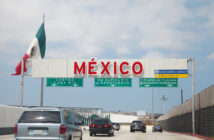Mass illegal migration is not only an American problem, but also a European one. Although the Biden administration’s self-inflicted crisis on our southern border has reached epic proportions, our North Atlantic Treaty Organization {NATO} allies in Central and Eastern Europe – Poland, Lithuania, and Latvia – have also been experiencing a migrant crisis on their frontiers, albeit admittedly on a much smaller scale. Even so, their tough and common-sense approach has kept the crisis contained, demonstrating that illegal migration is not some sort of unstoppable force of nature that countries can do nothing about.
Compared to 2020, attempted illegal border crossings – mainly by migrants from the Near East, including Iraqis, Syrians, and Afghans – into these countries have skyrocketed.
The three Central European governments have been blaming the post-Soviet dictator of Belarus, Alexander Lukashenko, who, ironically, began his career in the Soviet border guards during the late 1970s as a political officer in charge of indoctrinating the troops into communism. The pro-Russian Lukashenko – who has been ruling Belarus with a heavy hand since 1994 – has been angry with the European Union for sanctioning his regime for human rights abuses, and with the Poles and Balts for supporting the pro-democracy opposition in Belarus. In retaliation, the Belarusian dictator decided to unleash a border crisis to destabilize his western neighbors.
Poland’s Polsat News describes how the Belarusian regime is encouraging and facilitating mass illegal migration: “Iraqis purchase a trip to Belarus in a travel agency … Information about the trips and Lukashenko’s words are broadcasted on Iraqi state television. The travelers then receive a Belarusian tourist visa at the airport. Some decide to tour the country, while others immediately head for the border. The groups are escorted there by Belarusian government functionaries, and often taken on buses belonging to the Ministry of National Defense to the border crossings.” There is little doubt that Poland, Lithuania, and Latvia are not the migrants’ final destinations, but merely transit points on the way to wealthy Western countries like Germany.
The countries hit by Lukashenka’s “hybrid war” have taken the threat seriously, declaring states of emergency in border zones and initiating barbed wire barrier and border fence construction. Predictably, the pro-mass-migration crowd – lawyers, “human rights” activists, and liberal and leftist politicians – have been attacking these measures and calling upon their governments to essentially let them all in and sort it out later, which is a particularly reckless approach given how many migrants have no documentation on them. One liberal parliamentarian attempted to sprint past Polish border guards with supplies for the migrants, while police arrested activists trying to damage Polish border barriers in the name of “civil disobedience” (no doubt similar stunts remind many Americans of the “abolish ICE”/anti-enforcement movement back home).
In spite of this, the Central European governments have not relented and are not allowing migrants to enter, arguing correctly that they are now the responsibility of Belarus, which invited them in in the first place. These actions have been depicted in an unflattering, critical light by some in the West, including media outlets, Human Rights Watch, and certain politicians (one Irish Member of the European Parliament complained that, by building a border fence, Poland is committing an act “no better than what Trump was trying to do along the US-Mexico border”).
The EU, however, is critical of the Lukashenko regime’s cynically engineered migrant crisis – stating that it does not oppose border fence construction, as long as EU funds are not used. German Chancellor Angela Merkel went even further, condemning Belarusian actions as “completely unacceptable.” Merkel has seemingly learned her lesson from the 2015 migrant crisis, when her naïve “we can do this” attitude further encouraged hundreds of thousands of migrants to pour into Europe.
The lessons of 2015 are no doubt an important part of the reason why the Poles, Lithuanians, and Latvians are drawing a hard line. As Poland’s Deputy Foreign Minister said, “[i]f we accept this group, the next moment we will have not 10 or 20…but 1,000, 2,000 and 10,000” migrants trying to enter. On this side of the Atlantic, Joe Biden’s border policies have shown how true these words are, because once potential border crossers learn that some are being allowed in, more and more migrants will attempt to take their chances.
But there are other reasons why the Central Europeans are protecting their borders so resolutely. After all, it was only three decades ago that Poland, Lithuania, and Latvia reclaimed their independence from the Soviet empire after half a century of the Kremlin’s communist yoke. And before that, the region had a long history of foreign invasions and occupations as well, which has taught Central Europeans not to take national sovereignty and borders for granted, but to cherish them as something precious and essential. Moreover, unlike other Western nations, the Central Europeans cannot be morally blackmailed into opening their borders by invoking the legacy of Western colonialism in the Near East – mainly because the roles were often reversed in Central and Eastern Europe, which had to resist Ottoman aggression for centuries, and which was often the victim of recurring Muslim slave raids.
In any case, if the Biden-Harris administration does not wish to learn from the Trump administration, it would do well to at least consult America’s Central European NATO allies for tips on how to approach illegal migration. Although the American left typically strives to emulate Europe, in this case, the White House has been consistently doing the opposite of what Central Europe is doing.




